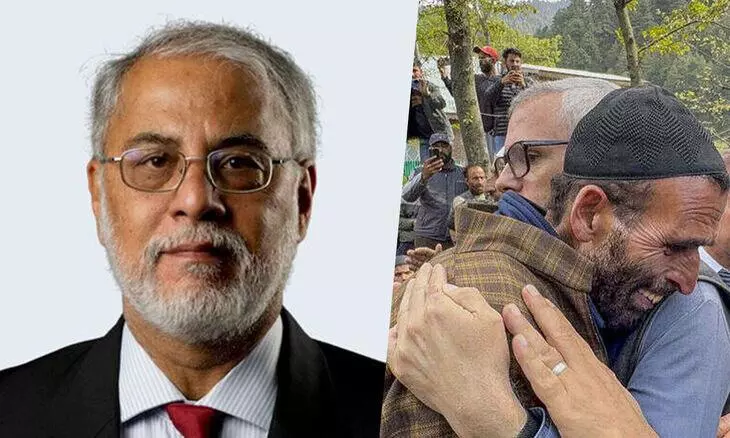
Manoj Joshi (Left). J&K Chief Minister Omar Abdullah consoles the father of Adil Hussain Shah, a pony ride operator who was killed in the terror attack in Pahalgam. Photo: PTI
Pahalgam terror: Time for India to act decisively against Pakistan, says strategic expert
Manoj Joshi talks about the growing threat of Pakistan-backed terror groups and the effectiveness of India’s counter-terrorism efforts in the Kashmir valley

India is grappling with the aftermath of a deadly terrorist attack in Pahalgam, Kashmir, where at least 26 people were killed in an assault that has left the region on edge.
The attack, which coincides with the peak of the Amarnath Yatra, has prompted global leaders, including US President Donald Trump and Russian President Vladimir Putin, to offer their condolences. As the situation remains tense, Manoj Joshi, Distinguished Fellow at the Observer Research Foundation (ORF) and an expert in strategic affairs, spoke with The Federal about the growing threat of Pakistan-backed terror groups and the effectiveness of India’s counter-terrorism efforts in the Kashmir valley.
Edited excerpts:
The Resistance Front - considered a proxy of Hafiz Saeed’s terror network - has claimed responsibility for the attack, and considering the presence of multiple Pakistan-backed terror outfits like Lashkar-e-Taiba, Jaish-e-Mohammad, Jamaat-ud-Dawa, and Hizbul Mujahideen, how does the Indian Army determine the actual perpetrators behind such incidents?
At this stage, there is no specific information confirming who was behind the attack, though based on past experience, the modus operandi - such as wearing army fatigues - points toward Lashkar-e-Taiba. It’s unclear whether the group has officially claimed responsibility.
Also Watch: Pahalgam attack: 'Pak can't tolerate lifestyle improving in Kashmir'
Could you just give us a sense of what happens on the ground with the security forces at a time like this?
Security forces are now likely hunting for the perpetrators in the surrounding hills and valleys. They may deploy drones and sift through existing intelligence, including electronic surveillance, in an effort to track down those responsible. While it's possible the attackers are heading toward the Pakistani border, there's also a chance they may have taken local shelter. At this point, several possibilities remain open, and there is no confirmed information on their whereabouts.
Do you think it could have been prevented or do you think this is something beyond the control of the Army considering the nature of the area?
Pahalgam, a region that hasn’t witnessed such violence in years, has been rocked by a deadly attack that killed 26 civilians - an alarming spike in a state where violence had significantly declined. In 2001, over a thousand civilians were killed in Kashmir, but in recent years, the annual toll had dropped to around 30–35; last year saw 31 civilian deaths. Authorities, observing this downward trend, did not anticipate such a brutal resurgence. Officials suggest a sense of complacency may have set in due to the consistent drop in terror-related civilian casualties over two decades. Notably, in 1993, six foreigners were kidnapped from Pahalgam - one escaped, but the others remain missing. Despite Kashmir’s challenging terrain, incidents like this underline the persistent threat, even in areas once considered relatively secure.
Also Read: In photos: Terror attack disrupts peace in Kashmir’s Pahalgam
The attack comes at a time when JD Vance and his wife are here in India. This is also the peak season ahead of the Amarnath Yatra where you could expect a lot of Hindu devotees to travel, with Pahalgam being the longer route. And most recently, Pakistan’s Army Chief has raked up a two-nation theory where he said Kashmir is Pakistan's jugular vein. Should we be connecting the dots?
While the connection between the recent violence and Vance’s India visit or the Prime Minister’s trip to Saudi Arabia remains uncertain, it is clear that the resurgence of tourism in Kashmir, which symbolised a return to normalcy, was a key target. Terrorists appeared intent on shattering this perception of peace, with their primary goal seemingly to disrupt the growing sense that stability was returning to the region.
Understanding terrorists’ modus operandi has been absolutely crucial for effective counter terrorism efforts. How do you see this has changed over the years? While we unfortunately hear news of civilian casualties, attacks on tourists are very rarely heard of. In fact, the local economy thrives on tourism.
While civilian casualties in Kashmir remain a grim reality, attacks targetting tourists are rare, making the recent incident all the more alarming. The local economy depends heavily on tourism, and while many Kashmiris may support separatist aspirations, they do not wish to see the region’s economic backbone destroyed. In contrast, Pakistan-based terror groups have no such reservations. Their objective has been to deliberately sabotage the perception of peace by targetting tourism - and in this case, they appear to have achieved that goal.
Also Read: Pahalgam attack: 'Nothing to do with it', Pakistan claims; Delhi skeptical
Home Minister Amit Shah is in Kashmir, Prime Minister Modi who was in Saudi Arabia on a state visit cut short his trip. Both have said that the terrorists won't be spared. What could actually be an ideal response to send the perpetrators the right message?
After major attacks like Pulwama and Uri, India responded with strikes on terrorist training camps in Balakot and surgical raids in Pakistan, respectively. Experts argue that the government should consider a similar response to deter Pakistan-based terrorism. With sufficient intelligence on terrorist facilities in Pakistan, the message must be clear: Pakistan’s military support for these groups cannot go unchallenged. While the consequences of such actions must be carefully considered, doing nothing is not an option. Historical attacks on civilians, such as the Amarnath Yatra massacre in 2017 and the Kulgam attack in 2019, show a pattern of violence that demands a strong deterrent. The time to send a decisive message to Pakistan is now.

